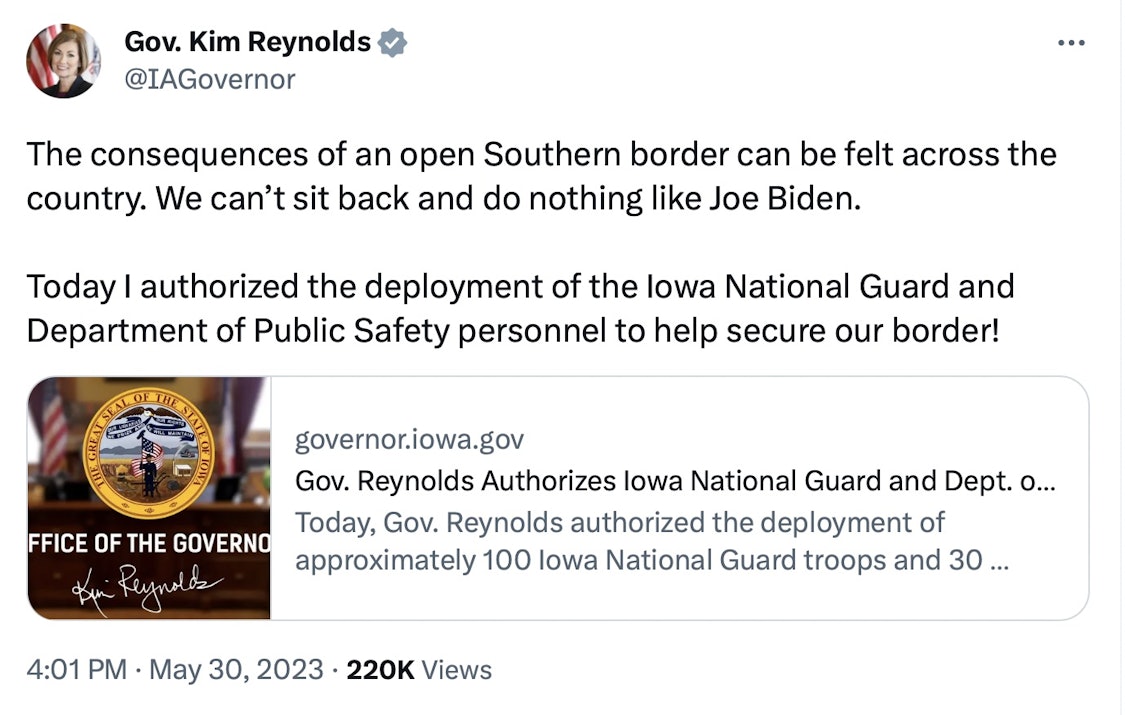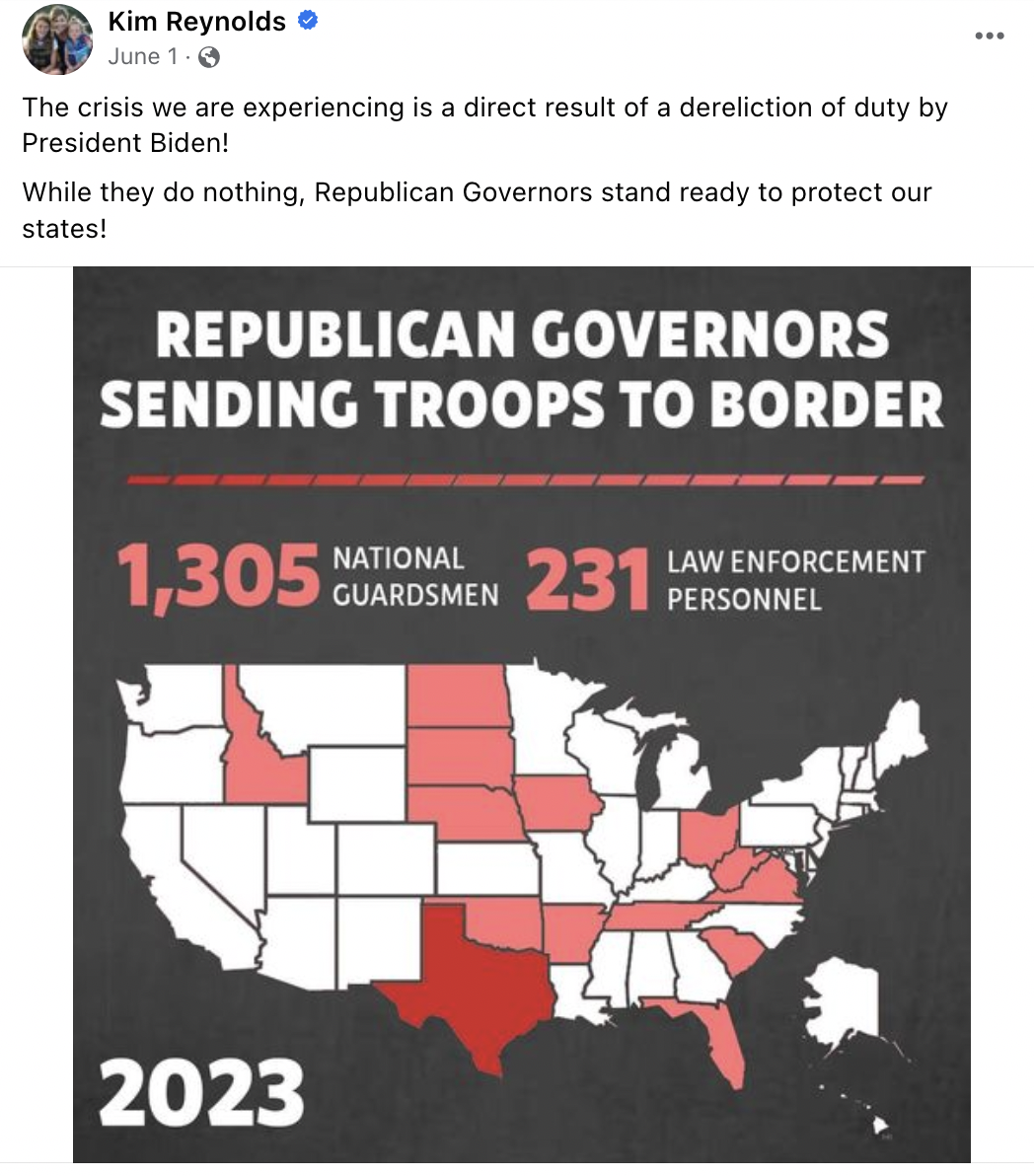Governor Kim Reynolds announced on August 2 that 109 Iowa National Guard soldiers were en route to Texas, where they will be deployed through September 1 “in support of Operation Lone Star to help secure the U.S. Southern Border following the end of Title 42.” In addition, the Department of Public Safety will send Iowa State Patrol officers to Texas from August 31 through October 2, to assist Texas state troopers with various law enforcement activities.
The governor’s news release confirmed that “federal funding allocated to Iowa from the American Rescue Plan” will cover “all costs” associated with these deployments. The statement went on to assert, “States are given flexibility in how this funding can be used provided it supports the provision of government services.”
Not so fast.
While the American Rescue Plan did give states more leeway than previous federal COVID-19 relief packages, ARP funds are still subject to detailed federal rules. A plain reading of those regulations suggests deploying Iowa National Guard and law enforcement to the U.S. border with Mexico does not fall under any eligible category.
Reynolds’ public statements about Operation Lone Star also confirm the mission is not related to the pandemic.
The governor’s spokesperson Kollin Crompton ignored Bleeding Heartland’s questions about Reynolds’ decision to tap this funding stream for Texas deployments. The Iowa Department of Management, which monitors the state’s use of federal COVID-19 relief funds and reports on how Iowa has used ARP funds, referred questions to the governor’s office.
It’s not clear whether anyone on the governor’s staff or in the Iowa Department of Management conferred with federal officials or state auditors before Reynolds authorized the use of ARP funds for Operation Lone Star. Staff in the U.S. Treasury’s Office of Inspector General did not respond to Bleeding Heartland’s inquiries. UPDATE: A.J. Altemus, acting counsel to the Inspector General, confirmed on August 7, “we have not reviewed the use of funds you describe.”
Sonya Heitshusen, public information officer for the Iowa State Auditor’s office, responded only in general terms: “The Office will review spending and make final determinations about the legality and appropriate use of American Rescue Plan funds in the course of its work.”
“TO PROVIDE GOVERNMENT SERVICES UP TO THE AMOUNT OF REVENUE LOST DUE TO THE PANDEMIC”
Soon after Democrats in Congress approved and President Joe Biden signed the ARP in 2021, Reynolds bashed the law as an “overreaching, unconstitutional stimulus bill that does nothing but bail out blue states.”
Now she would have Iowans believe the ARP is a blank check for anything a red-state governor wants, as long as the program “supports the provision of government services.”
That’s not accurate. The ARP allocated $350 billion in State and Local Fiscal Recovery Funds to facilitate state, territorial, local, and Tribal governments’ “response to and recovery from the COVID-19 public health emergency.”
The law outlined four broad areas where governments can use those fiscal recovery funds. Three of them are not relevant to this discussion: to address the “negative economic impacts” of the pandemic through “assistance to households, small businesses, and nonprofits, or aid to impacted industries such as tourism, travel, and hospitality”; to provide premium pay for essential workers; and to “make necessary investments in water, sewer, or broadband infrastructure.”
Reynolds is hanging her hat on a fourth category of allowable spending. The Treasury Department summarized it as follows (emphasis in original): “Replace lost public sector revenue, using this funding to provide government services up to the amount of revenue lost due to the pandemic.”
The final rule adopted in 2022 put it this way: “For the provision of government services to the extent of the reduction in revenue due to the COVID–19 public health emergency relative to revenues collected in the most recent full fiscal year prior to the emergency.” The regulations explained the federal government’s intention in great detail, beginning on page 4400. Excerpt (emphasis added):
This provision allows recipients experiencing budget shortfalls to use payments from the SLFRF funds to avoid cuts to government services and, thus, enables state, local, and Tribal governments to continue to provide valuable services and ensures that fiscal austerity measures do not hamper the broader economic recovery.
The state of Iowa has a large budget surplus, not a shortfall.
Moreover, sending National Guard personnel and state troopers to Texas is not a way “to avoid cuts to government services” here. Nor does it “continue to provide valuable services” Iowans already receive. On the contrary: one could argue these deployments will reduce available services to Iowans, as state troopers spend a month in Texas instead of performing their usual duties.
Reynolds claimed last week that the deployments will help Iowans because “every state is a border state, and Iowa’s unique location at the intersection of two major interstates makes it a target for human traffickers and drug cartels.”
Whatever your views on immigration policy or the value of sending Iowa personnel to Texas, the fact remains that the ARP allocated funds to help state and local governments adapt to “revenue reductions caused by the public health emergency.”
When state or federal auditors review the use of ARP funds for Operation Lone Star, the Reynolds administration will struggle to demonstrate the program had any relationship to the pandemic.
“A DIRECT RESULT OF A DERELICTION OF DUTY BY PRESIDENT BIDEN”
In her office’s August 2 news release, Reynolds elaborated on the reason for the mission:
On his first day in office, President Biden reversed commonsense policies that protected the U.S. Southern border and American citizens. Since that time, our country has experienced a historic rise in illegal immigrants and illicit drugs entering our country. Two years later, every state is a border state, and Iowa’s unique location at the intersection of two major interstates makes it a target for human traffickers and drug cartels.
The Biden Administration has failed to respond to the crisis at the border and, in doing so, has failed the American people – Iowans included. They have created one of the most significant national security and humanitarian crises of our generation and are blatantly ignoring the impact it’s having on our states, cities, and our people.
Since the administration refuses to invest in securing the border and protecting its citizens, Texas has asked other states to help, and Iowa is ready and willing to assist.
Iowa is deploying National Guard troops and personnel from the Department of Public Safety to protect the citizens and interests of our state by supporting Operation Lone Star and helping secure the U.S. Southern border.”
What’s missing from this picture? Any reference to the COVID-19 pandemic. It’s all about the Biden administration’s alleged negligence: they “failed to respond” to the border crisis, “have created” a humanitarian crisis, and “are blatantly ignoring” its impact. Iowa and other states are sending troops to Texas not because of ongoing fallout from the pandemic, but because the Biden administration “refuses to invest in securing the border.”
The day Reynolds announced the planned deployments in May, she tweeted from her official account, “The consequences of an open Southern border can be felt across the country. We can’t sit back and do nothing like Joe Biden.”

Two days later, Reynolds posted on her political Facebook page, “The crisis we are experiencing is a direct result of a dereliction of duty by President Biden!”

In reality, southern border crossings declined after the Biden administration ended the “Title 42” policy in May, and the downward trend continued in the early summer. But that’s a topic for another day.
Whether it’s a good or bad idea to send Iowans to Texas over the next two months has no bearing on whether Reynolds is allowed to use ARP funds for that purpose.
When auditors review these expenditures for compliance with federal law, they won’t ask whether the governor was right to help secure the southern border.
Rather, they will consider whether the spending helped Iowa replace revenue lost due to the pandemic, and provide government services that would otherwise have been cut because of those revenue losses.
Final note: if federal auditors eventually determine Operation Lone Star was not an allowable use of ARP funds, the remedy will be for Iowa to return the money. In 2020, Reynolds had to return $21 million to Iowa’s Coronavirus Relief Fund after she attempted to spend CARES Act money on the Workday computer system. Republican lawmakers later approved a special appropriations bill to use state funds for the Workday costs.
UPDATE: In her Noheartland newsletter, Andy Kopsa also questioned the use of ARP funds for this deployment and has sought comment from Treasury’s Office of Inspector General.
The Des Moines Register’s Stephen Gruber-Miller reported,
Kollin Crompton, a spokesperson for Reynolds, said Reynolds has used the money for projects “aimed at strengthening the state’s economy, workforce, infrastructure and public health.”
“This investment is no different. The health of our people and economy is directly threatened by the illegal drugs flowing through the southern border and into our state,” he said in a statement, pointing to an increase in fentanyl and methamphetamine seizures in Iowa since the start of the pandemic.
SECOND UPDATE: On the evening of August 7, Crompton emailed a longer version of the comment previously quoted in other news reports:
The ARP funds being used are from the State and Local Fiscal Recovery Fund. States are given flexibility as to how this funding can be used provided it supports the provision of government services through Expenditure Category 6. With the support of the Iowa Legislature, Governor Reynolds has obligated ARP SLFRF funding to projects that support Iowa’s continued resiliency and long-term, sustainable success. The state has prioritized transformational one-time investments aimed at strengthening the state’s economy, workforce, infrastructure, and public health.
This investment is no different. The health of our people and economy is directly threatened by the illegal drugs flowing through the southern border and into our state. The State of Iowa has seen a dramatic increase in the amount of fentanyl and methamphetamine seizures since the pandemic — the grams of fentanyl seized from CY 2020 (4,009) to CY 2022 (24,002) increased by 498% — and much of it can be traced back to Mexican drug cartels. During a 90-daystretch between March and May of this year, the Iowa Department of Public Safety in conjunction with local and federal law enforcement seized 363.5 pounds of methamphetamine, 72 pounds of cocaine, and 27,450 fentanyl tablets. The estimated street value of these seizures is in excess of $8,000,000 and the bulk of them had identifiable ties to the southern border. And as recently recognized by the White House’s Office of National Drug Control Policy’s High Intensity Drug Trafficking Area (“HIDTA”) in a report to Congress, “Mexico-based DTOs continue to traffic and distribute drugs throughout the [Midwest] region, and account for the bulk of smuggling and distribution. The opioid epidemic, which has spread across the Nation, has not left the Midwest untouched.”
Moreover, the State of Texas requested resources through the Emergency Management Assistance Compact (EMAC). Iowa’s participation as a member in the Emergency Management Assistance Compact (EMAC) (Iowa Code Section 29C.21) authorizes Iowa’s government services. Article II of EMAC specifically states, “[Iowa] recognizes that many emergencies transcend political jurisdictional boundaries and that intergovernmental coordination is essential in managing these and other emergencies under this compact.” Transnational drug trafficking and mass illegal immigration is the type of emergency that transcends boundaries and requires the states to coordinate in its management.
No one disputes that the opioid epidemic affects the Midwest, or that Iowa law enforcement have seized more illicit drugs in recent years. That’s not the issue here.
Crompton referred to “Expenditure Category 6,” which the Treasury Department has defined as “Revenue Replacement.” See page 79 of this “User Guide” released in 2022 to help government bodies understand which expenses are allowable through the State and Local Fiscal Recovery Fund. The user guide does refer to “provision of government services”—in the context of revenue shortfalls due to the pandemic. The document explains that ARP funds are intended to help recipients “maintain vital services amid revenue shortfalls.”
Even if Iowa could demonstrate that it needed federal funds to replace lost revenue, sending military and law enforcement personnel to Texas is not maintaining services for Iowans.
I have asked Crompton to point me to specific passages in the federal rule that support the governor’s interpretation of the guidance, which seems to be that Reynolds can use ARP funds for any government services intended to address any big problem.
While the Emergency Management Assistance Compact may authorize Reynolds to send Iowa resources to fight drug trafficking in Texas, I don’t see how it obliges the federal government to pay for those deployments, either through the ARP or any other pot of money. I am seeking further clarification from the governor’s office.
Top image of Governor Kim Reynolds speaking to Iowa National Guard personnel was first published on the governor’s official Twitter feed on August 2.


1 Comment
Good Government
It would seem that a caring government would identify ways to utilize these funds to support service and business organizations in Iowa that are still finding their footing in the face of pandemic economic headwinds. But, I guess, good government doesn’t get much attention among the conservative chattering class.
Current political trends in Iowa will make it difficult to stop the ideological overreach of the Iowa GOP. So, the objective is to limit it. With high turnout among all Iowans who value democracy and good government in 2024, we can alter the current trajectory of our politics.
It is a realistic goal to flip two U.S. House seats and reduce GOP majorities in the Iowa legislature in 2024. We’re just beginning to feel and see the impact of the legislative progress that was achieved during the first two years of the Biden administration. There is a strong narrative that when Democrats lead, the lives of everyday Americans improve.
A Democratic majority in Washington in 2025 would enhance economic fairness; respect the healthcare rights of women; continue progress on climate change; seek fairness in voting rights; reduce child poverty; further limit the number of right-wing judges; ensure ongoing support for Ukraine; further strengthen relationships with NATO and other allies around the world . . . and most vital . . . stand-up and stand strong for democracy itself.
Good work Laura. Keep shining your spotlight in their dark places.
William Sun 6 Aug 10:03 AM